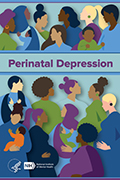Women and Mental Health
Why is women’s mental health important?
Some mental disorders are more common in women than men, including depression, anxiety disorders, and eating disorders.
There are also disorders unique to women. For example, some women experience symptoms of depression at times of hormone change, such as:
- During or after pregnancy (perinatal depression)
- Around the time of their period (premenstrual dysphoric disorder)
- During the menopause transition (perimenopausal depression)
When it comes to other mental disorders, such as schizophrenia and bipolar disorder, research has not found sex differences in the rates at which they are diagnosed. But certain symptoms may be more common in women, and the course of illness can be affected by a person’s sex. Researchers are beginning to tease apart the various biological and psychosocial factors that may impact mental health.
Latest news
- Basic Research Powers the First Medication for Postpartum Depression
-
• Feature Story
Decades of NIMH-supported basic research led to a pioneering treatment for postpartum depression and continues to power exciting advances in women's mental health care.
- Intervention Reduces Likelihood of Developing Postpartum Anxiety and Depression by More Than 70%
-
• Press Release
Results from a large clinical trial funded by the National Institutes of Health show that an intervention for anxiety provided to pregnant women living in Pakistan significantly reduced the likelihood of the women developing moderate-to-severe anxiety, depression, or both six weeks after birth.
- Combined, High Maternal Stress and Prenatal COVID-19 Infection May Affect Attention Span in Infants
-
• Media Advisory
Prenatal COVID-19 infection increased the risk for impaired attention and delayed socioemotional and cognitive functioning among infants of mothers who experienced high psychosocial stress during their pregnancy.



Unless otherwise specified, the information on our website and in our publications is in the public domain and may be reused or copied without permission. However, you may not reuse or copy images. Please cite the National Institute of Mental Health as the source. Read our copyright policy to learn more about our guidelines for reusing NIMH content.




